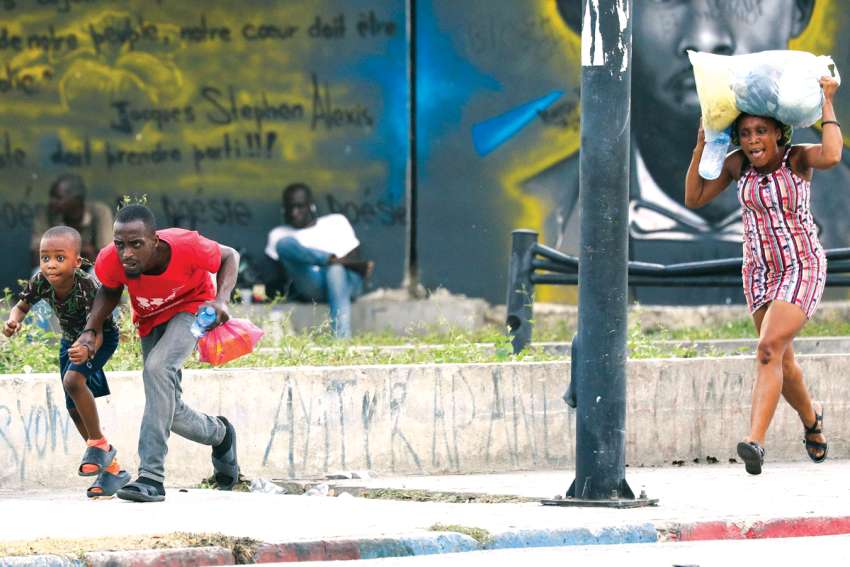She was referring to the four Haitian organizations with whom D&P walks in solidarity, supporting them in every way, but respecting the Catholic principle of subsidiarity, which ensures that local partners take the lead, identify their own needs and implement projects in their own culturally appropriate ways, with international organizations assisting them when necessary.
Currently, the Haitian people are facing the most serious crisis since the fall of the Duvalier regime in 1986. Armed street gangs control nearly 80 per cent of the capital city Port-au-Prince, and Haiti’s national police continues to be overwhelmed. There is a lack of basic services and public security in Haiti, one of the world’s poorest nations, and leadership is almost non-existent following the resignation March 11 of Prime Minister Ariel Henry.
Adding to Haitians’ burdens is the severe scarcity of food. The United Nations World Food Programme has warned that Haiti is on the edge of a devastating hunger crisis, with humanitarian operations at risk of grinding to a halt, as rampant insecurity limits access to communities and donor funding dries up. The situation is “cataclysmic,” according to a March 28 report issued by UN High Commissioner for Human Rights.
Durran elaborated on the situation of D&P’s local partners risking their lives to help the most vulnerable in their country.
“The staff members of our partner organizations put the communities’ needs before their own,” Durran said. “Many of them could have left Haiti by now and gone to seek asylum elsewhere (some already have visas to Canada or the United States.) But they choose to stay in Haiti and work for a better future for their country.”
D&P’s partners are working to address the food shortage, uncontrolled violence and other monumental problems that have exacerbated the woes of the poorest country in the Caribbean.
Fanm Deside is one of the organizations D&P supports. It works with victims of gender-based violence and raises awareness of the situation of women among the population in the southeastern part of the country.
“I know that the staff requesting help from Fanm Deside are mainly women, some on their own, and some rape victims themselves,” said Durran.
Other D&P partners are La Rosée, IRATAM and ITECA.
La Rosée, a social and solidarity economy company, ensures the strengthening of food security through the production of guinea fowl. Its office is located in Croix-des- Bouquets, a suburb in the north of Port au Prince once known as a cultural centre, but now ground zero of the brutal gang violence.
IRATAM works mainly in the north with peasant women to strengthen their resilience and autonomy by supporting the production of poultry and eggs, fruits and vegetables while ITECA works with small farmers in rural communities.
“Twenty-eight of their staff members have been displaced by violence and one woman had her house and all its contents completely destroyed,” Durran said. She added that so far nothing has happened at the ITECA head office, but staff had asked for D&P’s help to secure its head office and field offices, and want to purchase fireproof filing cabinets.
A staff member at La Rosée emphasized the importance of D&P’s support.
“The support from Development and Peace encourages us to hold on. Our greatest hopes are to gain stability and revitalization of institutions in order to find a lasting solution to this crisis which is gnawing away at the country.”
D&P has been active in Haiti for many years. It is now taking steps to fulfill partners’ requests and is appealing to Canadians for help in the current crisis, said Durran.
“We are sending funds to allow ITECA to provide money to 55 families in rural communities. These families have taken in others displaced from the Port-au-Prince region.”
She emphasized, however, that D&P is providing this help with the principle of subsidiarity, as elucidated by Pope Francis, firmly entrenched as its guiding principle. The goal is to ensure that its partners are able to continue their work and not be forced to depend on international aid organizations.
With this in mind, D&P is also providing an initial fund of $150,000 to some partner organizations to ensure their humanitarian work in their communities. In addition, D&P will provide a further $40,000 to Farm Deside which has been inundated with cries for help from people fleeing Port-au-Prince, including victims of rape. These funds will be used for medical expenses for victims, and about 100 women will be given a small grant to start a micro business selling food, toiletries and other essentials.
“We would ask Canadians to pray for Haiti, and to consider earmarking a portion of their charitable donations for D&P’s support of Haiti,” Durran said.

